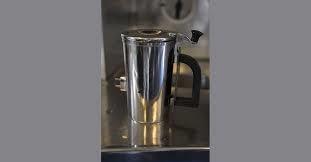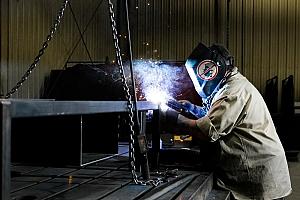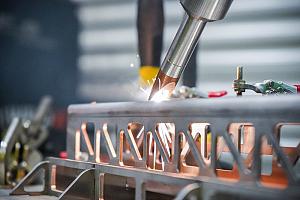- FMA
- The Fabricator
- FABTECH
- Canadian Metalworking
Our Publications
Categories
- Additive Manufacturing
- Aluminum Welding
- Arc Welding
- Assembly and Joining
- Automation and Robotics
- Bending and Forming
- Consumables
- Cutting and Weld Prep
- Electric Vehicles
- En Español
- Finishing
- Hydroforming
- Laser Cutting
- Laser Welding
- Machining
- Manufacturing Software
- Materials Handling
- Metals/Materials
- Oxyfuel Cutting
- Plasma Cutting
- Power Tools
- Punching and Other Holemaking
- Roll Forming
- Safety
- Sawing
- Shearing
- Shop Management
- Testing and Measuring
- Tube and Pipe Fabrication
- Tube and Pipe Production
- Waterjet Cutting
Industry Directory
Webcasts
Podcasts
FAB 40
Advertise
Subscribe
Account Login
Search
Oklahoma college to offer AM courses in wake of report about $1,300 Air Force coffee cups
- November 26, 2018
- News Release
- Additive Manufacturing

The Air Force was spending nearly $1,300 apiece to replace coffee cups when their handles broke. With 3D printing, it’s estimated that the cost to replace the handles will be 50 cents each. Credit: “Air Force Times”
Why spend almost $1,300 to replace a single, specialized coffee cup when it can be repaired for 50 cents? That's the essence of an October inquiry by Sen. Chuck Grassley, R-Iowa, to Air Force Secretary Heather Wilson.
In his letter, Grassley said that 25 replacement cups, each costing roughly $1,280, have been bought this year. In the past three years, the 60th Aerial Port Squadron at Travis Air Force Base in California spent nearly $56,000 to replace broken cups.
As reported in “Air Force Times”: “The cups, which plug into outlets on cargo planes to reheat liquids such as water or coffee, have a faulty plastic handle that easily breaks when the cups are dropped. And because replacement parts for the cup are no longer made, the Air Force has had to order a whole new cup when the handle breaks.”In her reply to Grassley, Wilson agreed it was “irresponsible” to spend thousands of dollars on parts that are out of production when technology exists to produce the parts affordably.
In July, she ordered a new Air Force Rapid Sustainment Office to be created to find ways to develop and deliver parts. “Air Force Times” reported that this office showed it can 3D-print replacement handles for the reheating cup for about 50 cents each.“We will no longer pay premiums for things we can manufacture on our own,” Wilson said in announcing the two-year test program. “We will leverage agile manufacturing and reform legacy sustainment processes to drive down costs and meet warfighter needs rapidly.” This paradigm shift to “manufacture our own” replacement parts has a much wider application than replacing cup handles.
That’s why Rose State College is partnering with Moog Inc. to develop additive manufacturing training for its adult workforce program that will benefit both the military and civilian concerns. Moog is an industry leader in aircraft flight controls system and flight control components.
“Additive manufacturing, which includes the commonly used term ‘3D printing,’ is a rapidly growing and changing discipline,” said Bryan Murphy of Moog. The “value of AM is that it is faster and cheaper than fabrication. Particularly when older aircraft, parts may not be readily available. Metal AM provides an efficient, cost-effective way to replace parts.”Moog, which has been involved in additive manufacturing since 2003, provided a metal laser powder bed infusion-based 3D printer to Rose State for the training and will assist in developing a multi-level curriculum.
"We are the only education institution in the state with a 3D printer of this magnitude," said Dean Dr. Wayne Jones, of Rose State’s Engineering and Science Division.Planned curriculum includes three courses, ranging from two days to five days each. The certificate courses include:─Introduction to Additive Manufacturing (AM-101)3D Printing/AM are hot topics among many manufacturers and across industries today – as these technologies will revolutionize manufacturing and the supply chain from concept into reality. The Introduction course is designed to give a process overview of the different additive manufacturing system, economics, and health and safety for a production environment. (2 days)
─Engineering and Design for Metal AM (AM-201)With the Design Engineer, in mind this course builds on the fundamental provided in the Introduction. With a focus on Laser Powder Bed Fusion (LPBF), a range of topics including designing for metal AM to process and quality controls will be discussed. (5 days)
─Practical Application for Metal AM (AM-301)Part of every technological revolution is the insertion of the technology into everyday life. Preparing current workforce for new technology insertion is a struggle that many businesses face today. The Practical Application course give students hand-on metal AM machine and process training to enter a production environment. Filled with machine lab exercises and limited classroom training, this course is designed for the metal AM machine operator. (5 days)
The first class has already been offered to 58 individuals with a collection of military and civilian students. Other courses will go on-line in early 2019.
“Rose State sees this as an important advancement in its workforce education program as additive manufacturing becomes more prevalent in military and civilian settings,” said Tamara Pratt, Vice President of External Affairs at Rose State College.
- Podcasting
- Podcast:
- The Fabricator Podcast
- Published:
- 04/30/2024
- Running Time:
- 53:00
Seth Feldman of Iowa-based Wertzbaugher Services joins The Fabricator Podcast to offer his take as a Gen Zer...
- Trending Articles
- Industry Events
Pipe and Tube Conference
- May 21 - 22, 2024
- Omaha, NE
World-Class Roll Forming Workshop
- June 5 - 6, 2024
- Louisville, KY
Advanced Laser Application Workshop
- June 25 - 27, 2024
- Novi, MI
Precision Press Brake Certificate Course
- July 31 - August 1, 2024
- Elgin,
























